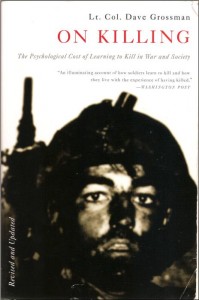The Psychology of Killing
by Michael Fogler
On Killing: The Psychological Cost of Learning to Kill in War and Society
Revised and Updated Edition 2009 by Lt. Col. Dave Grossman; published by Back Bay Books.
Lt. Col. Dave Grossman is a former army Ranger, paratrooper, and psychology professor at West Point. He retired from the army in 1998 to devote himself to the study of “killology” — a term he coined. Killology looks at why we humans have killed one another and the psychological toll it takes. This book is a treatise on that study.
First, a disclaimer: I’m a pacifist. I don’t believe in war; and I don’t think war really works. Yet, before reading this book, I haven’t had much in the way of substantive facts to back up my beliefs.
Enter Grossman, who is not a pacifist, who had a big career in the military, and who passes no judgment at all on whether we should be participating in war. All he does is present the facts. And the facts are devastating. The truth that Grossman delivers not only gives me some great talking points, it also gives me some hope for the world.
A previous military scholar named S.L.A. Marshall did some research about war following World War II that has forever changed military science and the way we prepare soldiers for war. Marshall found that in World War II, only 15 to 20 percent of soldiers actually fired their weapons. In previous wars, this (or a lower percentage) was true as well. Those soldiers who did fire their weapons, often deliberately aimed in the air. Marshall proved clearly that throughout history we humans have had a very difficult time killing one another, especially if we can see whom we are killing. Sane humans must overcome deep-seated psychological hardwiring that gives them a great resistance to killing their fellow humans. Humans naturally feel a connection with another’s humanity, even an enemy’s humanity. To overcome this hardwiring, it takes rigorous, methodical training.
Once the military found out this information they changed how soldiers were prepared for war. Something had to be done to overcome the innate human resistance to killing in order to have a more “efficient” war. The results of this new training are impressive. In the Korean War, the firing rate went above 50 percent. By the Vietnam War, it had topped 90 percent.
How was this done? Grossman, putting on his psychologist hat, likens the more recent war preparation training to Pavlovian classical conditioning and Skinnerian operant conditioning. Now, military science understands: create some distance and soldiers are much more likely to kill.
That distance can be physical (drop a bomb from a plane, for example) or psychological (the other side are demons, less than human, “gooks” or “commies,” etc). Another way to create distance is by creating absolution in a group. The military has increased the use and importance of group warfare; and when a group is firing, no one knows for sure whose ammunition actually causes the deaths.
Now, we have more “efficient” wars, but the price we pay for this training and the greater participation in killing is exorbitant.
That price includes suicides, PTSD, substance abuse, broken families, and the inability to function normally in society which causes a disproportionate percentage of our surviving soldiers to be among the homeless and those in poverty.
Add to this the increasing violence and dehumanization in television, video games, and the movies, and we have a compounded problem. Grossman is convinced that violence in the media significantly brings about more killing. Hence, we’ve had Columbine, Virginia Tech, and other events. Grossman summarizes that our culture and conditioning are producing a society with the safety switch turned off. Looking at the world today, who could argue with that?
The good news, contrary to popular myth, is that it is not in our nature to kill one another. I urge everyone to read this critically important book. The solid, illuminating research is graced by many gut-wrenching stories. This book will change your life — and your view of history and the nature of humankind.
– is a deeply personal issue that everyone decides for himself. Sometimes the price is high, sometimes low. But this is not very important for life. Life is an interesting thing. And the price on Viagra – too.



